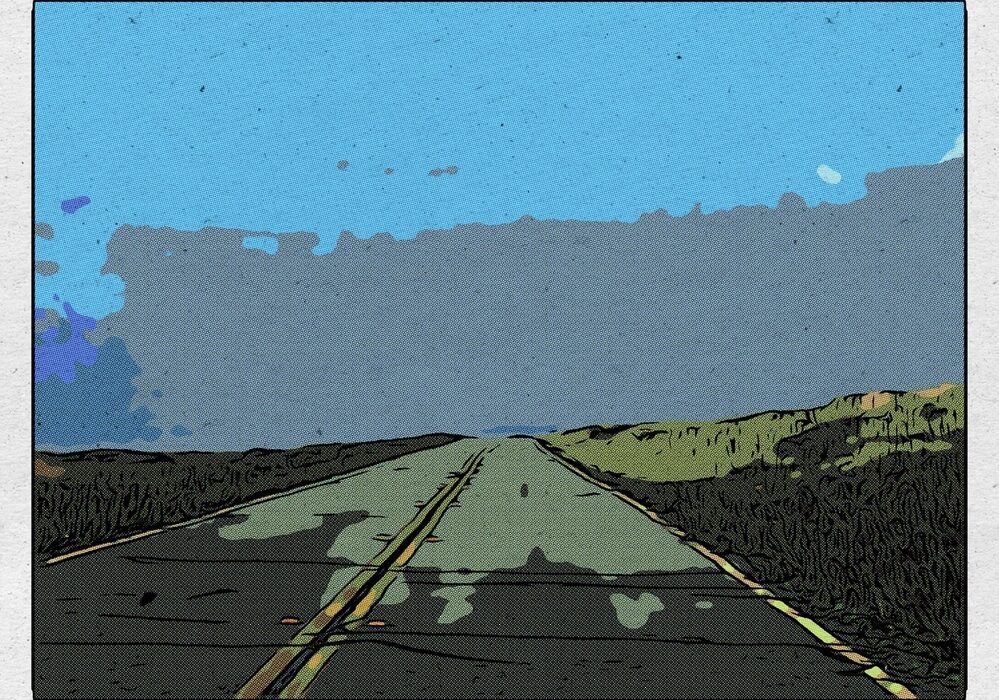I was hustling from point A to point B when I rounded the corner and saw this.
ɕ

I was hustling from point A to point B when I rounded the corner and saw this.
ɕ

What’s the longest stretch you’ve gone, away from your love of podcast creation?
For obvious reasons (in case you missed it) I’ve not been doing much in the way of podcasting this year. The last episode I published was March 28th, 2024— so about 8 months now. I’m at a point now, where I’ve enough health that it would be possible to resume . . .
I miss having the conversations, and I even miss doing the uncelebrated work (which we all know so well!) to get them published. But I don’t miss the grind… that treadmill feeling of always having some next thing that could be done.
What’s stopped you in the past? How did you get back on the bicycle? Why did you get back on the bicycle?
ɕ
I’m deep into NO!vember and of course the biggest reduction in overload is the practice of not adding more things. But I’m finding some snowball effect too: As I see the pile evaporating… as I’m not adding more things… I’m feeling more inspired and motivated to pick off one or two problem things.
One thing I will say about these lists: they are written as a way of fortune and future-telling and anticipating what a technology might do. But you often don’t know the answers to a lot of the questions until you adopt the technology.
~ Austin Kleon from, Questions for technology
slip:4uauqu1.
Kleon’s post is a significant collection of things (people who’ve dug into technology, lists of questions as way to evaluate technology, and more) for evaluating technology. But this point he makes at the very end is critical: Sometimes, you just can’t tell until you try it.
I hate that about technology. In fact, I use it as a key test of my own. If I cant’ tell without trying it, then it’s not worth my time trying.
ɕ
Reading time: About 5 minutes, 1000 words
Get 7 for Sunday in your inbox. → Subscribe here.
This issue is https://7forsunday.com/7
Contribute your suggestion without having built a body of work, without evidence of significant expertise and without being willing to take responsibility for what happens next.
It’s a form of yelling from the bleachers.
~ Seth Godin from, The grandstanders
slip:4usete12.
I was totally this person. Once I saw what was going on and I could work on owning and eliminating this aspect of my behavior. Awareness (after discovery), ownership (after reflection), and efficacy. The red-flag is when I’m queueing the words, “You know what you should…” for speaking. Stop. Stop stop stop. It’s like the humorous but often–true aphorism that nothing you say before the word, “but” matters. I never (okay, fine, I’m still working on it) say whatever was about to come after, “You know what you should do…” Because why ever say that?
I like to give a hat-tip to Angie Flynn-McIver any time I start talking about intention, as I’m about to. I realized that my intention behind that thing I no longer say was to demonstrate how much I knew. It doesn’t matter to the other person how much I know. What might matter to them is whether or not I can help them. It’s potentially better if I engage with the intention of being helpful. How would saying, “you should change your menu…” ever be helpful to the wait-staff, to the manager, to the chef or owner? The menu is beyond their control, or they have already thought about it way more than I have and have vastly deeper domain knowledge. If my intention is (as it now is) to be helpful, I should be paying attention for signs subtle or direct that someone would like help. Only then might I have something useful to add, but probably not.
ɕ
All courses of action are risky, so prudence is not in avoiding danger (it’s impossible), but calculating risk and acting decisively. Make mistakes of ambition and not mistakes of sloth. Develop the strength to do bold things, not the strength to suffer.
~ Niccolò Machiavelli
slip:4a660.
Hanlon’s Razor teaches us not to assume the worst intention in the actions of others. Understanding Hanlon’s Razor helps us see the world in a more positive light, stop negative assumptions, and improve relationships.
~ Shane Parrish from, Hanlon’s Razor: Not Everyone is Out to Get You
slip:4ufome1.
And there’s a rather long, (by Internet blog standards,) article after that opening paragraph. I read it. It resonates with me. It has heuristics and suggestions, points and counterpoints. There are some memorable quotes, including some famous Army General’s way of using the razor to categorize officers based on their combinations of traits.
But, being well aware of my title, I could just take the entire article and train of thoughts and teaching and simplify it to a pithy two-sentence reminder:
Don’t assume the worst intention in the actions of others. Instead, see the world in a more positive light.
ɕ
I’ve a system of daily reminders; of course it’s complicated.
For years now, a few of my reminders have simply been questions. I recently started writing something to go with those questions making them feel more at home with some of my other reminders and prompts which had some exposition with them when I found them. I thought it would be interesting to share what I added to this question today:
WHAT HAVE I BEEN READING? — I’ve performed this experiment countless times. Read less: nothing happens. Read more: ideas, new connections, inspiration, questions, motivation, short-cuts, wonder.
ɕ
“I am not my work,” is one of those aphorisms that I need to have etched into my cornea. Have you seen watermarks on images? I need this phrase watermarked directly onto my vision.
Long ago–if memory serves–I was motivated by extrinsics. Doing something well resulted in external confirmation; so generating that external confirmation was easy for me. But–as everyone knows–it’s a vicious cycle of saccharine sweetness. Eventually, that lesson was learned. The obviously better option is to be intrinsically motivated. Check. Got it.
Unfortunately for me, there’s another onion-skin layer to peal away below, “be intrinsically motivated,” which is to not take criticism of work done as criticism of myself. The immediate hack is that I’ve inserted a mandatory, “thank you,” in response to criticism. This doesn’t fix the problem of identifying myself with my work. But it does buy me a few moments. By the time I’ve said thank you and acknowledged the critic, it’s become possible to see the criticism as being ‘of the work.’ Crucial moments indeed.
ɕ
How can public spaces be designed to integrate parkour features while balancing community needs and architectural aesthetics?
Colin MacDonald discusses his experience designing parkour parks, and what he’s learned from the process. He shares thoughts on his creative process and inspirations before explaining more about Landscape Architecture and the program he is in. Colin unpacks some of his personal design and build dreams, along with the realities that affect them, and explores the connection between sculpture and parkour design.
I think that a well-designed parkour park—compared to something like a well-designed skate park—has the potential to serve a lot of populations.
~ Colin MacDonald (11:05)
Colin McDonald leaps into the creative and logistical aspects of designing parkour parks, exploring their potential to serve communities beyond the parkour practitioners themselves. He reflects on projects like Rose Park in Boise and Penzer Park in Langley, highlighting the balance between making a space inviting for movement and considering broader urban challenges. Colin also discusses the aesthetic and functional aspects of his work, emphasizing the importance of materiality and community integration.
Colin explores his influences, from urban sculptures to conversations with other parkour architects like Mikkel Rugaard. His interest in creating multi-use spaces reflects his vision for inclusivity and accessibility in public design. Beyond this, Colin shares insights on evolving parkour spaces from purely functional sites to places that are inspiring and aesthetically pleasing, contributing to a more dynamic urban environment.
Takeaways
Integrating parkour into public spaces — Colin emphasizes the balance between creating functional parkour features and ensuring spaces are welcoming to all.
Materiality in design — He reflects on the tactile and aesthetic importance of materials like wood and metal.
Community impact — Colin considers how spaces influence community behavior and activate underutilized areas.
Influence of public sculpture — He draws inspiration from large-scale public sculptures for parkour park designs.
Evolving creative process — Colin shares how conversations and collaborations have shaped his approach to designing movement spaces.
Resources
Parkour Visions — A non-profit organization focused on creating parkour parks and educational programs.
Street Movement — A design firm known for innovative parkour park concepts.
TraceSpace — A German firm creating distinctive parkour spaces using mixed materials like brick and timber.
(Written with help from Chat-GPT.)
ɕ
“The appearance of the bull changes when you enter the ring.” The matador’s point of view is different from the spectator’s.
~ Mexican proverb
slip:4a206.

So I went for a walk to shake off the aches from two solid days of training at the new LVPK Academy. And I got to the part where I normally loop back and I thought, “I’ve never actually walked up to that upper parking lot…” So I did. Above the lot, another level higher, is a wide open soccer/football field with brilliant green grass, and those 5-tier, ubiqitous, aluminum bleachers. I laid down on the top-most, narrow bleacher– just basking as the bright sun, and the cold wind argued back and forth about wether it was warm or cold weather. Just staring up at this gorgeous blue sky containing one of those new-fangled aeroplanes and one of those old-beaked vultures– the teeny tiny black speck near thebottom, just a bit to the right, …you thought it was a mark on your screen didn’t you? Ever do that yoga pose where you cross your legs and lay back on something alinged along your spine, put your hands behind your head, crack open your entire chest, pull your shoulder blads back and just streeeeeeeeeeeeeeeeeeeeetch?
ɕ
When you’re stuck in a black hole where it’s impossible for you to reach escape velocity, your only hope for escape is to find an even stronger gravitational field to pull you out. People act a lot like gravitational fields, and when you put enough of them together, all tugging at you in a consistent direction, you’re going to move.
~ Steve Pavlina from, You Need People
slip:4usebo18.
This is a vastly better version of the old adage, “you are the average of your five closest friends.” I very intentionally use the people I find and train with in the Art du Dèplacement universe in this way. (Semantic detour: I may have you plotted in the ADD space even if you would say you are in some other.) If I’ve trained with you, you now know why I am sincerely appreciative of _your_ contribution to my journey.
ɕ
The great thing about taking chances when you’re younger is you have less to lose, and you don’t know as much. So you take big swings.
~ Amy Poehler
slip:4a460.
You have exactly one life in which to do everything you’ll ever do. Act accordingly.
~ Colin Wright
slip:4a465.
Simplicity is the ultimate sophistication.
~ Leonardo da Vinci
slip:4a532.